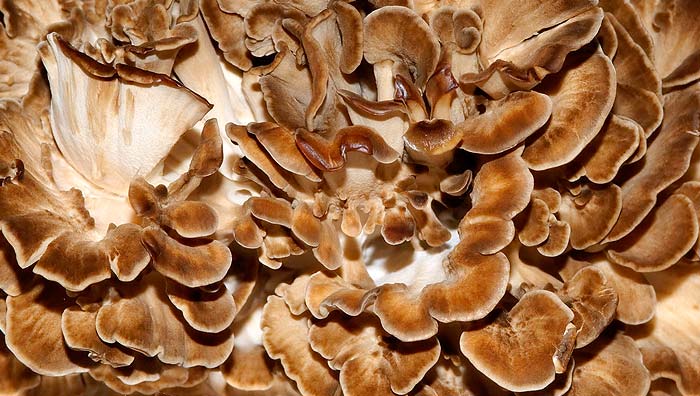HOME › MEDICINAL MUSHROOMS › GRIFOLA FRONDOSA
Grifola Frondosa (Maitake)

This is a summary of a full, technical and detailed monograph written by Stuart FitzSimons MNIMH and that can be viewed by clicking here! Remember, you can always call Stuart if you have any questions. 07802 408146.
This is a mushroom that has become connected with one man in particular, Dr. Hiroaki Nanba (Pharmaceutical University of Kobe), who is responsible for a great deal of the work both on isolating active components, such as D-fraction, and for the clinical studies carried out with Maitake.
Main active constituents
The main actives are polysaccharides and beta-glucans including D-fraction, later purified to MD-fraction. Dr. Hiroaki Nanba isolated D-fraction in 1984 and later purified it further and subsequently obtained a Japanese patent on MD-fraction in 1996.
What does Maitake do? How does it work?
Maitake has been tested against several types of cancer (in humans and cell cultures) including:
- Breast
- Bladder
- Kidney
- Prostate
- Liver
- Lung
- Brain
- Leukaemia
It has been found that the effect of Maitake in the treatment of cancer is mediated through several actions on the immune system and by directly affecting the process of the disease itself, including:
- 1. Activation of immune cells such as macrophages, natural killer cells, cytotoxic T-cells and dendritic cells.
- 2. It stimulates increased production of cytokines. Cytokines are chemicals produced by cells of the immune system to communicate with each other and to control an immune response. There are many cytokines controlling all aspects of the immune response. Some have names indicating what they do, TNF for example, which is tumour necrosis factor.
- 3. It stimulates phagocytosis, the process whereby cells of the immune system actively engulf and destroy things.
- 4. In terms of the underlying process of cancer, Maitake inhibits metastasis (stops spread), stimulates cell death in cancer cells and opposes new blood vessel growth in cancers thus starving it of blood, oxygen and nutrients.
Other effects of Maitake
Maitake is not just useful in the treatment of cancer, it has several other uses, including:
- 1. A chemo-protective effect.
This means that Maitake protects bone marrow from the effects of chemotherapy drugs and thus helps to maintain the blood cells and immunity in patients undergoing chemotherapy. - 2. Effects on blood lipids and blood pressure.
It has been demonstrated that using Maitake as a normal dietary item can reduce blood pressure, lower cholesterol, triglyceride and VLDL levels and some research suggests that it can reduce fat accumulation in the body. Maitake may also be useful to delay age related degenerative changes in the cardio-vascular system. - 3. Protection of the liver.
Maitake has been shown to help protect liver cells from damage caused by chemicals, drugs etc. Being an immune stimulant it may also provide protection for those suffering hepatitis. - 4. Blood sugar control.
Maitake has demonstrated in several studies that it helps to control blood sugar levels, even in diabetic animals. It does not just lower blood sugar in these instances but it has also demonstrated alpha glucosidase activity (preventing the digestion of sugars) and also an insulin sensitising effect (making insulin more effective). There is also research to suggest that Maitake may help to reduce damage to the pancreas induced by low grade inflammation. WARNING: If you are diabetic, do not use herbs such as Maitake without first seeking professional guidance. - 5. Polycystic ovarian syndrome.
This condition is one in which insulin resistance is an important factor. As we just mentioned, Maitake helps to improve insulin sensitivity and thus help the symptoms of PCOS. It is also interesting to note that Maitake has gained a reputation of being generally better for females than males! - 6. Inflammation of the bowel.
Maitake is a useful herb to alleviate bowel inflammation. Interestingly, this activity is shared with the other medicinal mushrooms. - 7. Neurotrophic effect.
This means protecting the brain and nervous system which is another feature in common with the other mushrooms. Lion's mane is by far and away the top mushroom for this particular effect though. - 8. Anti-viral effect.
Maitake has shown good activity against Herpes simples (cold sore virus), influenza and it has been studied as a useful food supplement in HIV/AIDS patients.
Are there any side effects of Maitake? Are there any other drugs it should not be taken with?
Maitake is as safe as any food should be!
Do not take Maitake if you are taking warfarin, insulin or oral hypoglycaemics (blood sugar lowering drugs). Maitake does not affect the ability to drive or operate heavy machinery and there is no reason why it should not be taken when pregnant of breast-feeding. It is safe for all age groups. Maitake should not be given to patients taking immunosuppressants after organ transplantation such as azathioprine, cyclophosphamide, ciclosporin or corticosteroids (prednisolone). Caution should be exercised in the use of Maitake in patients taking methotrexate for inflammatory conditions such as RA.
Hemp Seed Oil
'Liquid Engineering for the Human Body'

READ ONLINE →
VISIT THE PAGE →
The information is made available with the understanding that the author and publisher are not providing medical, psychological, or nutritional counseling services on this site. The information should not be used in place of a consultation with a competent health care or nutrition professional.





